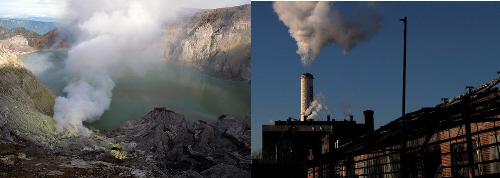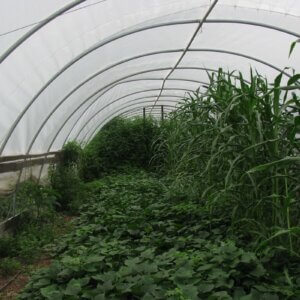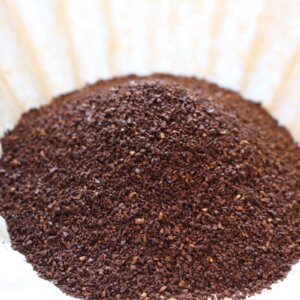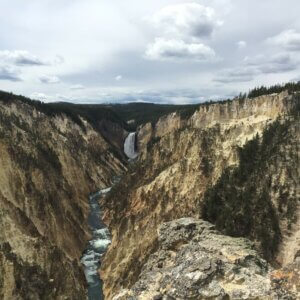If you’ve followed the debate over climate change even a little, you likely know the main causes of global warming: concentrations of greenhouse gases build up in the Earth’s atmosphere, and create a “greenhouse,” or warming effect.
You’re likely also aware that evidence of past warming periods has fueled the argument that natural causes are largely responsible for current global warming, and thus, our choices of ways to reduce global warming are limited. If Nature’s calling the shots, is there any reason to change human activities that increase levels of carbon dioxide, methane, and other greenhouse gases?
While arguments persist, there’s little doubt that human-produced greenhouse gas emissions play a major role in the current warming trend. Nature has a role, but it pales in the face of increasing emissions from human activity.
What are some of the natural causes of global warming?
Think back to science classes from school. You undoubtedly learned at some point that carbon dioxide is a naturally-occurring compound, that it provides food for plant life, and that animals breathe it out. You may have also learned that decaying organic material releases CO2. There’s no need to question these facts. Greenhouse gases can be emitted into the atmosphere from a variety of natural sources.

Skeptics of climate science, however, have latched onto a number of natural phenomena, and attempted to argue that they’re primary global warming causes. Some of the natural occurrences you may have heard discussed include:
Volcanic Eruptions
Yes, volcanoes emit CO2 when they erupt; as Grist‘s Coby Beck showed, though, volcanic CO2 emissions do not outweigh those produced by humans.
Solar Cycles And Cosmic Ray
If you followed discussions about the causes of global warming at all, you’ve run across this argument. A recent study released by a group of European scientists concluded that “The chance of the natural cosmic-ray or solar irradiance explanation being responsible for more than 14% of the observed warming is quite negligible.” Originally sourced from environmentalresearchweb.org/cws/article/research/38751
Water Vapor
You may have heard the claim that water vapor’s the most prevelant greenhouse gas, and therefore is the main cause of global warming (not CO2). This is half true. Water vapor is the most prevalent gas; however, it’s produced as feedback of increased CO2 emissions, and is not a “forcing” of global warming.
Why human causes of global warming are a much bigger problem
Many of the activities you take for granted ultimately contribute to global warming, including
- Driving your car
- Turning on your air conditioning or heat
- Eating food that is locally out of season (or not locally grown), and shipped from other parts of the country or world
All of these activities rely on the use of fossil fuels. Burning of these fuels releases carbon dioxide… but CO2 that exists in a very different part of the carbon cycle. Fossil fuels are sequestered carbon: the elemental remains of organic entities (plants, animals) that were “stored away” by natural systems in order to maintain stability in the climate. You may find it ironic that many scientists and engineers are searching for ways to sequester carbon emissions: Nature had already done it quite well!
Related Post: Climate Change Organizations
When you release carbon from fossil fuels by burning them, you’re essentially contributing to an “overflow” of greenhouse gases in the atmosphere. This overabundance of heat-trapping gases can lead to:
- Rising sea levels
- Changes in seasonal weather and precipitation patterns
- Increased severe weather effects
- Lower rivers and lakes that are fed by snow and ice melt-off
- Habitat changes for a wide variety of plants and animals
So, can you claim a straight-line, cause-and-effect relationship between climate change and these phenomena? No… but we do know that climate change increases the probability of these effects. Consider Colorado University climate scientist Brad Udall’s analogy: the climate is like a six-sided die, with “Two faces [that] say warm, two normal, two cold. That is your normal climate… We have now changed it. Now it says three warm, two normal and one cold.” “Rolling the die” becomes much more treacherous.
Do natural events and occurrences play a role in global warming? Definitely. But if we’ve learned anything from studying the geological record, it’s that nature’s time table is very different from the one for the current warming cycle — the climate has never warmed at this quick a pace. We also know that extreme climate changes produce extreme results for life on Earth… and that you want to do your part to ensure that such results don’t occur more quickly than they might otherwise.
If you’re looking for more detailed scientific information about the causes of global warming, check out the International Panel on Climate Change’s “Summary for Policymakers” of its Fourth Assessment Report.
Image credits: takomabibelot and flydime at Flickr under a Creative Commons license










































From one point of view it doesn’t matter what the cause . Fact is this planet is
getting hotter . Even a proovable increase of 0.1 degree in 100 years is a huge amount.
The scientists argue that it can decrease the same amount .However , how come the
scientists can’t calculate what exactly is going on . They can find planets travelling at
50 million miles an hour to black holes . What about the heat caused by nuclear reactors? The ultimate irony is that the people who make the the most noise about
GW have the biggest carbon footprints as they jet about from one summit to the next.
“Skeptics of climate science, however, have latched onto a number of natural phenomena, and attempted to argue that they’re primary global warming causes.”
……
Incorrect, there is no “primary” cause of of Glowbull warming.
My opine on this is simple,keep on sucking all the oil all over this planet,which acts like a
coolant in your car causing the planet to overheat like your car engine would with no oil
to cool it,warm planet heats up the oceans, volcanoes erupt like the radiator in your car ,
spewing ashes into the clouds causing acid rain back to earth killing plant life and poisoning our waters and fish.
Give it some thoughts and logic kicks in and guess what?
You’ll agree or disagree as I think it makes as much sense as other theories I’ve read.